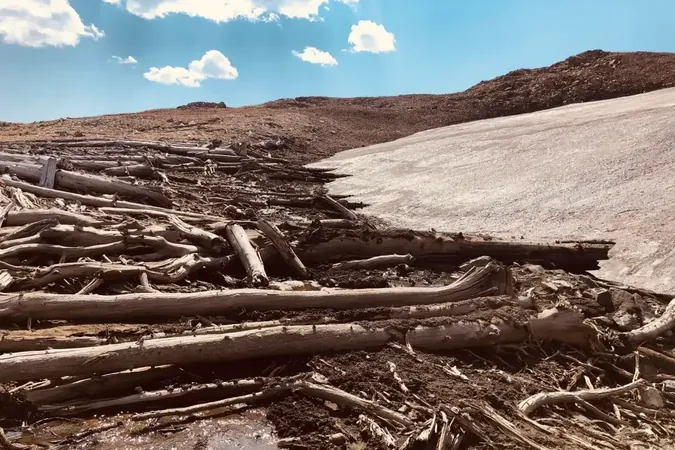
Unearthed Secrets: 6,000-Year-Old Pine Forest Revealed by Melting Ice in the Rocky Mountains
2025-01-19
Author: Siti
Unearthed Secrets: 6,000-Year-Old Pine Forest Revealed by Melting Ice in the Rocky Mountains
In a stunning revelation, melting alpine ice in the Rocky Mountains has unveiled a hidden gem: a 5,900-year-old whitebark pine forest. This extraordinary discovery occurs amidst a backdrop of alarming climate change, bringing to light ancient ecosystems that were previously concealed beneath layers of ice.
Researchers conducting an archaeological survey on the Beartooth Plateau in Wyoming estimated the presence of over 30 ancient trees, located at an astonishing elevation of 3,100 meters (about 10,170 feet), which is 180 meters higher than the current tree line. The implications of this find are profound for scientists studying historical climate conditions.
Cathy Whitlock, a prominent researcher at Montana State University, emphasizes that this discovery provides a unique insight into the climatic conditions of high elevations in the past. "Whitebark pine (Pinus albicaulis) does not grow at this elevation today, indicating that the climate was significantly warmer when these trees were alive," she explained.
Dating suggests that these trees flourished between 5,950 to 5,440 years ago, a period marked by a gradual temperature decline. Researchers utilized tree-ring analysis and carbon dating to piece together the timeline of this ancient forest. The question arises: what caused this change in temperature?
To explore this mystery, scientists turned their attention to ice core data from Antarctica and Greenland, revealing that centuries of volcanic eruptions in the northern hemisphere contributed to significant climatic shifts. These eruptions produced ash and particulate matter that obscured sunlight, leading to the cooling of temperatures necessary for the survival of the forest.
Joe McConnell from the Desert Research Institute in Nevada confirmed that the notable temperature drop around 5,100 years ago was largely due to ongoing volcanic activity in Iceland. Notably, the well-preserved state of these ancient trees suggests they were protected beneath the ice for approximately 5,000 years. While it's still being investigated whether avalanche coverage played a role in their preservation, researchers observed marks on the trees correlating with the expansion of the current ice patch.
So why are we only just seeing these trees now? The acute rise in global temperatures, driven by climate change, has led to the melting of ice and the unveiling of these long-buried secrets. Whitlock warns that as temperatures continue to increase, "the current tree line is likely to shift upslope in the coming decades."
"This discovery was made possible by anthropogenic climate change—rising temperatures are exposing areas that have been buried by ice for millennia," she remarked. While such findings are scientifically fascinating, they serve as a poignant reminder of the fragility of alpine ecosystems amid climate disruptions.
Kevin Anchukaitis from the University of Arizona characterized this revelation as a "valuable ‘time capsule’" that not only illuminates the mountain forests of 6,000 years ago but also provides critical insights into the climate conditions that allowed this vibrant ecosystem to thrive.
This remarkable finding is not the first of its kind; previous discoveries include ancient wooden shafts believed to have been used for crafting arrows and darts, with one shaft dating back over 10,000 years. These artifacts illustrate the long-standing relationship between humans and high-elevation environments.
As researchers continue to unearth more from the melting ice of the Rocky Mountains, they remind us of the urgency to understand and protect our planet's changing climate. Expect more astonishing revelations in the face of a warming world—and the lessons they might teach us about resilience and adaptation.
In related news, scientists have also identified massive underwater oceans beneath Earth's crust, prompting further exploration into our planet's hidden depths. The quest for knowledge continues!


 Brasil (PT)
Brasil (PT)
 Canada (EN)
Canada (EN)
 Chile (ES)
Chile (ES)
 Česko (CS)
Česko (CS)
 대한민국 (KO)
대한민국 (KO)
 España (ES)
España (ES)
 France (FR)
France (FR)
 Hong Kong (EN)
Hong Kong (EN)
 Italia (IT)
Italia (IT)
 日本 (JA)
日本 (JA)
 Magyarország (HU)
Magyarország (HU)
 Norge (NO)
Norge (NO)
 Polska (PL)
Polska (PL)
 Schweiz (DE)
Schweiz (DE)
 Singapore (EN)
Singapore (EN)
 Sverige (SV)
Sverige (SV)
 Suomi (FI)
Suomi (FI)
 Türkiye (TR)
Türkiye (TR)
 الإمارات العربية المتحدة (AR)
الإمارات العربية المتحدة (AR)